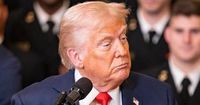On April 16, 2025, U.S. District Judge James Boasberg ruled that there is "probable cause" to hold the Trump administration in criminal contempt for violating his order regarding the deportation of alleged Venezuelan gang members. This decision marks a significant moment in the ongoing legal battles surrounding immigration policy and the executive branch's authority.
Judge Boasberg's ruling stems from actions taken on March 15, 2025, when President Trump invoked the Alien Enemies Act, a law dating back to 1798, to summarily deport Venezuelans he claims are members of the gang Tren de Aragua. Following the proclamation, the government sent several planes carrying these alleged gang members to El Salvador, despite a temporary restraining order issued by Boasberg that barred any deportations under the wartime statute.
In his 46-page decision, Boasberg stated, "The Court ultimately determines that the Government's actions on that day demonstrate a willful disregard for its Order, sufficient for the Court to conclude that probable cause exists to find the Government in criminal contempt." He emphasized that the court did not reach this conclusion lightly and had previously given the defendants ample opportunity to rectify their actions, which they failed to do.
The judge's ruling is particularly noteworthy given the escalating tensions between the Trump administration and the federal judiciary over immigration issues. Boasberg expressed frustration at the government's noncompliance, stating, "None of their responses has been satisfactory." He provided the administration with a week to submit a declaration outlining its plan to address the contempt finding, which includes allowing the deported individuals the opportunity to challenge their removability in court.
If the administration does not comply, Boasberg indicated he would seek sworn witness testimony to determine who made the decision to proceed with the deportations despite his orders. This could lead to further legal ramifications, including potential prosecution for contempt of court.
In response to the ruling, White House communications director Steven Cheung stated that the administration plans to seek "immediate appellate relief." He reiterated President Trump's commitment to ensuring that "terrorists and criminal illegal migrants are no longer a threat to Americans and their communities across the country." This reflects the administration's ongoing focus on immigration enforcement, particularly concerning individuals deemed dangerous.
The controversy surrounding the deportations intensified after the American Civil Liberties Union (ACLU) and Democracy Forward filed a lawsuit against the Trump administration, arguing that the deportations were executed without due process. The groups contend that the administration's actions violate constitutional protections, as many of those deported were not given an opportunity to contest their removability in court.
Judge Boasberg's temporary restraining order, issued shortly after the flights carrying the Venezuelans took off, aimed to halt the deportations. However, despite the order, planes carrying these individuals continued to land in El Salvador, where they were transferred into custody. Boasberg noted that the Justice Department's arguments claiming he overstepped his authority by interfering in foreign policy were unconvincing, stating, "the Constitution does not tolerate willful disobedience of judicial orders — especially by officials of a coordinate branch who have sworn an oath to uphold it."
The Supreme Court recently weighed in on the matter, ruling that while the Trump administration could use the Alien Enemies Act for deportations, individuals must be given due process to contest their removability. This ruling added another layer of complexity to the ongoing legal battle, as it did not address the legality of the administration's actions but rather the procedural rights of the individuals involved.
Boasberg's latest ruling is a clear indication that the judiciary is closely monitoring the administration's compliance with court orders. He emphasized that if the government chooses to disobey the order rather than wait for it to be reversed through the judicial process, such disobedience is punishable as contempt. This statement underscores the judiciary's role in maintaining checks and balances on executive power.
The implications of this ruling extend beyond the immediate case at hand. It raises fundamental questions about the balance of power between the branches of government and the rights of individuals facing deportation under controversial laws. As the legal proceedings continue, the outcomes will likely have lasting effects on immigration policy and the treatment of noncitizens in the United States.
As the situation unfolds, the administration's response will be closely scrutinized, particularly as it navigates the complexities of both legal and public opinion. The stakes are high, not only for the individuals involved but also for the broader implications of executive power and judicial oversight in matters of immigration.
In a statement following the ruling, Lee Gelernt, the lead attorney for the plaintiffs from the ACLU, expressed optimism about the court's focus on ensuring due process for those affected. He stated, "We are committed to fighting for the rights of individuals who have been subjected to unlawful deportations without the opportunity to contest their cases in court."
As the April 23 deadline approaches for the Trump administration to respond to the court's order, all eyes will be on how the government chooses to proceed. Will they comply with the court's directives, or will they continue to challenge judicial authority? The answers to these questions could shape the future of immigration policy and the relationship between the executive branch and the judiciary.
Ultimately, Judge Boasberg's ruling serves as a reminder of the importance of upholding the rule of law and the rights of all individuals, regardless of their immigration status. As the legal battles continue, the outcomes will resonate far beyond the courtroom, impacting the lives of countless individuals and the principles that guide the nation's governance.





